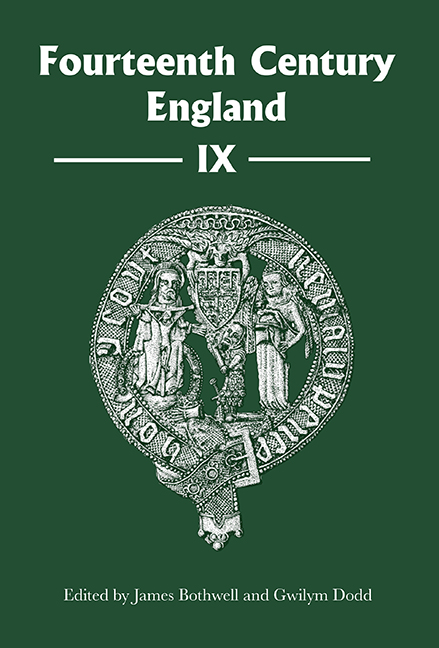Book contents
- Frontmatter
- Contents
- List of Illustrations
- Contributors
- Preface
- Abbreviations
- The Death of Edward II Revisited
- Living in the Shadows: John of Eltham, Earl of Cornwall (1316–36)
- Careers of the Lesser Parochial Clergy Before the Black Death
- Heritage and Symbolism: the Romans and Tanners in Fourteenth-Century York
- ‘Let Them Realize What God Can Do’: Chivalry in the St Albans Chronicle
- Historical Writing in the North-West Midlands and the Chester Annals of 1385–88
- High-Status Execution in Fourteenth-Century Ireland
- Traitor to the Chose Publique: Negotiating Constitutional Conflict Through the Law of Treason 1399–1402
- Notes and Documents – A Letter from Chatton: the Date and the Writer
- Fourteenth Century England Issn 1471–3020
Historical Writing in the North-West Midlands and the Chester Annals of 1385–88
Published online by Cambridge University Press: 07 May 2022
- Frontmatter
- Contents
- List of Illustrations
- Contributors
- Preface
- Abbreviations
- The Death of Edward II Revisited
- Living in the Shadows: John of Eltham, Earl of Cornwall (1316–36)
- Careers of the Lesser Parochial Clergy Before the Black Death
- Heritage and Symbolism: the Romans and Tanners in Fourteenth-Century York
- ‘Let Them Realize What God Can Do’: Chivalry in the St Albans Chronicle
- Historical Writing in the North-West Midlands and the Chester Annals of 1385–88
- High-Status Execution in Fourteenth-Century Ireland
- Traitor to the Chose Publique: Negotiating Constitutional Conflict Through the Law of Treason 1399–1402
- Notes and Documents – A Letter from Chatton: the Date and the Writer
- Fourteenth Century England Issn 1471–3020
Summary
The religious houses of the English north Midlands do not enjoy any great reputation as centres of chronicle writing in the fourteenth century. Even the best known of them, the Cistercian house at Dieulacres outside Leek in north Staffordshire, drew only the grudging assessment of its most recent editors, namely that it had attracted ‘an interest far in excess of its historical value [and contained] … little more of value than a description of the revolution of 1399’. Two Benedictine houses, Burton in Staffordshire and Chester in Cheshire, had both produced chronicles in the thirteenth century, but only the former has acquired any real standing amongst historians as a major source for England in the 1250s. But, despite some literary and narrative style, it was mostly, concluded Alan Harding, ‘the work of an archivist with access to the diocesan records of Lincoln and Lichfield’. At Chester in the fourteenth century the monk Ranulf Higden wrote what would become the most copied of universal histories, the Polychronicon, which, although it can be read as a commentary on contemporary concerns in the first half of the century, rather supplied the necessary older history that would preface the later contemporary accounts of his continuators. It was sold, copied and continued everywhere in England except, it seems, at his own house. However, the later traditions of chronicle writing in this region may yet be worth some reassessment, and this chapter will suggest the existence of a textual community centred on Lichfield in which chronicles were routinely borrowed and copied. Interestingly, the borrowing would appear to have taken place between houses of different orders: two Cistercian abbeys, the Benedictine house at Chester and the cathedral of secular canons at Lichfield. It will also publish for the first time some Chester annals for the years 1385 to 1388, which, it will be argued, may have some connection to the chronicle associated with Dieulacres.
We are concerned here with historical writing derived from four religious houses: the Benedictine house of St Werbergh at Chester; two Cistercian houses in Staffordshire, at Croxden and Dieulacres; and the secular cathedral of St Chad at Lichfield.
- Type
- Chapter
- Information
- Fourteenth Century England IX , pp. 109 - 130Publisher: Boydell & BrewerPrint publication year: 2016



